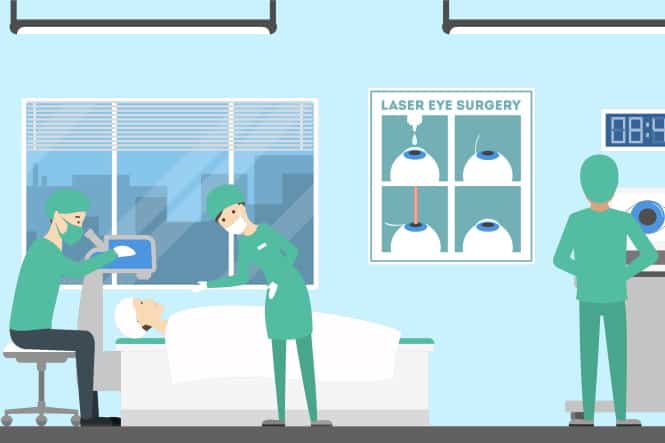Popular Options for Vision Correction in Kansas City are Available at Durrie Vision
LASIK surgery and refractive lens exchange (RLE) are two popular forms of laser vision correction. At Durrie Vision, we analyze patients’ vision and eye health regularly to determine whether they’re candidates for either of these common procedures.
As vision correction experts, we receive many questions each day about what patients can expect from our procedures, how we determine who qualifies for LASIK surgery or RLE, and more. We’re always happy to answer them – and now we’re making it easy for you to find more information about what you’re curious about.
Questions About LASIK Surgery
Is my vision too poor for LASIK surgery?
People with nearsightedness, farsightedness, or astigmatism qualify for LASIK. However, many more factors go into determining whether a vision correction procedure is right for you. During our examinations at your consultation visit, one of our eye surgeons can determine your candidacy while considering a number of factors.
Even if LASIK isn’t right for you, Durrie Vision offers six other laser vision correction procedures.
Why should I choose Durrie Vision for my LASIK surgery in Overland Park?
At Durrie Vision, our eye surgeons perform a type of LASIK called Sub-Bowman’s Keratomileusis, or SBK. It is the most advanced form of laser vision correction today.
While you can receive SBK from other eye surgeons, you’ll want to choose Durrie Vision because our own founding doctors, Daniel Durrie, MD, and Stephen Slade, MD, developed this procedure.
Does LASIK surgery last forever?
Results from your LASIK surgery are lasting because LASIK is a permanent change to your cornea. As you age, your eyes may experience natural changes, like presbyopia, which affect your near vision. These changes typically begin in your late 40s to mid 50s and can be addressed with alternative treatments at that time. If you’re diagnosed with it, there are options for treating it, too.
Are there risks to LASIK?
Lasik eye surgery is very safe, and few patients experience complications. This is why, when you opt for LASIK surgery, you should choose an eye surgeon who will carefully screen you to be sure that you are an excellent candidate.
How long is the recovery for LASIK surgery?
Most patients experience short-term blurry vision for the first couple of hours after the procedure, but it rapidly improves. After your post-operative visit the morning after surgery, you are free to return to all your normal activities.
Am I under anesthesia during LASIK?
For most laser vision correction procedures, you are awake. However, your eye surgeon will provide medications to help you stay relaxed and still throughout it.
Is there an age limit for LASIK candidates?
You must be at least 18 years old to undergo most types of laser vision correction surgery. This is because your eyes are rapidly changing and growing until young adulthood, before stabilizing at about age 18.
Questions About Refractive Lens Exchange
How does refractive lens exchange (RLE) eliminate the need for cataract surgery in the future?
During RLE, your natural lens is removed and replaced with an artificial one. Cataracts, which tend to yellow or dim your vision, cannot develop on artificial lenses. Therefore, you will not need cataract surgery after you’ve had RLE.
When can I get refractive lens surgery?
RLE is for people 50 or older who have suffered a progressive deterioration of vision due to aging.
Implanted organs can reject. Can my intraocular lens from RLE reject?
Intraocular lenses are made of a special acrylic material. It will not react, degrade, change color, or reject over time.
Does refractive lens surgery prevent macular degeneration?
Macular degeneration affects the retina at the back of the eye. RLE addresses the lens at the front of the eye. Having RLE will not prevent you from developing macular degeneration.
Can I get refractive lens surgery even though I have astigmatism?
Yes. Many people with astigmatism are candidates for this laser vision correction procedure. RLE also helps correct refractive errors associated with nearsightedness, farsightedness, and presbyopia.
Do I receive anesthesia before undergoing RLE?
A topical anesthetic or local anesthetic, accompanied by a mild sedative, prepare you for your laser vision correction procedure.
I didn’t get laser vision correction earlier in life, and now I’ve lost near vision, too. Why did that happen?
During your youth, your natural lens serves as a “zoom” function on a camera, so you can focus up close without needing bifocals or reading glasses. As you age, your lens can become dysfunctional, resulting in presbyopia. Left untreated, this ultimately develops into a cataract. Another result of aging, cataracts block and scatter light, making it hard to see.
Thankfully for our patients, refractive lens exchange is a vision correction procedure that can improve both conditions in older adult patients.
How Can I Ask More Questions about Laser Vision Correction?
If you’re interested in improving your vision and reducing your reliance on eyeglasses, bifocals, or contact lenses, or if you have questions about the laser vision correction procedure that you’re about to receive from one of our skilled eye surgeons, contact Durrie Vision directly.
Start the process by completing our self-candidacy test online before scheduling your consultation with us, or call us directly with your questions at (913) 491-3330.

Author Bio: Jason E. Stahl, MD
Top Doctors: https://www.castleconnolly.com/top-doctors/jason-e-stahl-ophthalmology-129cc002150
Best Cataract Surgeons: https://bestcataractsurgeons.com/cataract-surgeons/jason-e-stahl/

